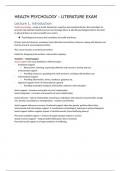Summary
Summary Health Psychology Literature (Master Health Sciences VU)
- Course
- Institution
Summary of all exam literature and materials used in the seminars of the course Health Psychology. I passed my exam with a 9.0 with this summary!
[Show more]



